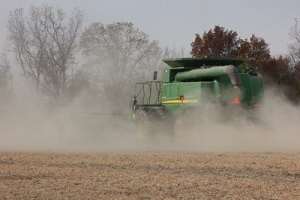By Marilyn Thelen
Every year there are reports of combine fires. In a study of nearly 9,000 grain combine fires in the U.S., it was reported the majority (41.3 percent) were caused by crop residue. Crop residue and dust accumulate on engines and cracks and crevices through the combine. Managing this is key to decreasing risk of fire starting on the combine. Managing this is key to decreasing risk of fire starting on the combine. When it comes to preventing combine fires, there are the three P’s to remember: prevention, preparation and practicality.

Prevention
- Keep the machine clean. Power-wash to remove caked-on grease, oil and crop residue. During harvest, frequently blow dry chaff, leaves and other crop materials off the machine. Remove any materials that have wrapped around bearings, belts and other moving parts. Be sure to check those pockets where wires or lights are housed and chaff accumulates.
- Eliminate heat sources. Exhaust systems surfaces, exposed electrical wiring and worn bearings, belts and chains can potentially generate enough heat to start dust and crop residue on fire. Check these areas daily and make repairs if there are problems.
- Don’t park a hot combine in the shed or shop. After a long day of harvesting, smoldering hot spots may be present in the combine. If those spots suddenly flare up, at least you won’t lose the building!
Preparation
- Keep at least one fully-charged, 10-pound ABC dry chemical fire extinguisher with an Underwriter’s Laboratory approval in the combine cab.
- Mount a second, larger fire extinguisher on the outside of the machine that can be reached from ground level.
- Recharge partially discharged extinguishers.
- Have a cell phone.
- Have a plan. Turn off the engine, get the fire extinguisher and your phone. Get out and get help.
- Stay a safe distance away.
- Know when to wait for help.
Practicality
- Get out of the combine.
- Call 911 before beginning to extinguish the fire.
- Approach the fire with extreme caution. Small fires can flare up quickly with the addition of air (by opening doors or hatches).
- If fire begins spreading in the field, try to contain it. This may include tilling a strip around the fire to create a barrier.
- Consider your safety first. Combines can be replaced!
So are you are getting ready for the 2016 harvest, take the right steps to prevent a combine fire, but be prepared just in case and remember, safety first!
Source: msu.edu